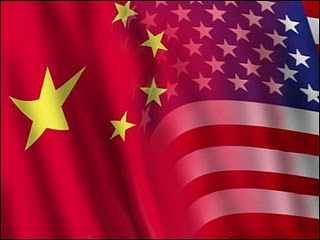
We Don’t Have to Dance to the Beat of U.S. Drums in Asia
(China) on 28 December 2010
by Sun Peisong (link to original)
On the surface, the problem on the Korean peninsula looks as though it is caused by North Korea’s “rash behavior,” but if we look deeper, we see that it is instead the effect of America’s strategic attempts. Following the end of the Cold War, China and South Korea established diplomatic ties in 1992, realizing normalization of relations; the U.S., however, refused to implement normalization of relations with North Korea. If the U.S. and North Korea were to achieve normalized relations, the U.S. military would then lose its reason for being stationed in South Korea. The U.S. military withdrawal from South Korea would also endanger the status of American troops encamped in Japan, and the military presence in Northeast Asia would lose its foundation. Normalization of U.S.-North Korean relations runs contrary to America’s interests in Asia.
To ensure American primacy, the U.S. needs to achieve its strategic objectives in both Europe and Asia: In Europe it must prevent Russia from uniting with Europe, and in Asia it must prevent China from uniting with Japan. From the end of World War II to the present, the U.S. has been consistently successful at this. Now, in order to continue splitting apart Asia and to make Japan and South Korea (two countries that are able to buy sophisticated American weapons) continue to provide orders for the American military industry, and in order to establish a missile defense system aimed at China and Russia, the U.S. needs to scatter the seeds of large-scale military engagement in Northeast Asia. North Korea manufactures tension in order to reach a peace agreement with the U.S., following which it can create a secure environment for national development. The U.S., however, uses these tensions to pursue even deeper geostrategic goals.
At present, it is not war that the U.S. needs, but instead a tense state of affairs that it can control. Thus, on the one hand it toughens its stance toward North Korea, while on the other hand it also persuades South Korea to exercise restraint; on the one hand it joins with South Korea to force North Korea from its living space, but on the other hand it thrusts responsibility for the Korean peninsula’s unrest onto China.
The current situation of unrest on the peninsula, on the international stage, has been viewed as the result of China’s indulgence of North Korea’s malicious intentions. The American, Japanese and South Korean media have spoken in unison, denouncing China for siding with North Korea, for not doing more to restrain North Korea and for being irresponsible, and it has even been said that China is exploiting the division on the peninsula for its own gains. At the peninsula’s periphery, a network of military allies are gaining strength, and joint military exercises have continued without pause, stirring up confusion and noise, one after another. Thus, attention to the core of the problem has already been covered up by this clamor.
Behind North Korea’s daring challenge to the U.S., Japan and South Korea, there is, of course, the China factor. No matter under what conditions, for China, the eruption of war has no benefits and could only be harmful. China’s apprehensions about war have already turned into the weight of every party threatening China.
The essence of the issue on the peninsula is: If we really hope for this region to have a secure and stable environment, the U.S., Japan and South Korea need to give up forcing North Korea out of its own living space. Those from the hawk faction within South Korea’s government especially need to give up their toughened agenda toward the North and their one-sided, pro-America foreign policy. However, on the backdrop of political elections, no political figures are willing to do this. Weakness could mean forfeiting political authority. They need a tough policy and a negative, eternally restless China as incentive to advance their political agenda of fear.
Therefore, China does not need to move its feet to the strategic beat of America’s drums in Asia. Since Japan and South Korea feel that operating in coordination with the United States’ Asia strategy can gain them security, then why not let them get tossed from side to side? Today’s China no longer needs to have many misgivings about war imposed by the outside world, but Asian security will probably come at the cost of a period of instability. Europe experienced the Hundred Years’ War, the Thirty Years’ War and two world wars before it understood the reason behind unity. The effect of history is much greater than the effect of man, and it is even easier to convince people of history’s conclusions. If the U.S., Japan and the Koreas aren’t afraid to fight, what is China worried about? If they were to fight a bit, only then would they probably come to understand whether they are really safe.
(The author is the director of Jiangsu Lianyungang Development Research Institute.)
